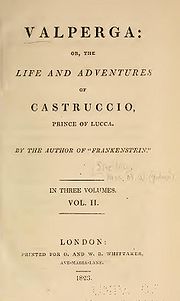
Valperga (novel)
Encyclopedia

Historical fiction
Historical fiction tells a story that is set in the past. That setting is usually real and drawn from history, and often contains actual historical persons, but the principal characters tend to be fictional...
by the Romantic
Romanticism
Romanticism was an artistic, literary and intellectual movement that originated in the second half of the 18th century in Europe, and gained strength in reaction to the Industrial Revolution...
novelist Mary Shelley
Mary Shelley
Mary Shelley was a British novelist, short story writer, dramatist, essayist, biographer, and travel writer, best known for her Gothic novel Frankenstein: or, The Modern Prometheus . She also edited and promoted the works of her husband, the Romantic poet and philosopher Percy Bysshe Shelley...
, set amongst the wars of the Guelphs and Ghibellines
Guelphs and Ghibellines
The Guelphs and Ghibellines were factions supporting the Pope and the Holy Roman Emperor, respectively, in central and northern Italy. During the 12th and 13th centuries, the split between these two parties was a particularly important aspect of the internal policy of the Italian city-states...
, (the later of which she spelled "Ghibeline".)
Publication details
Mary Shelley's original title is now the subtitle; "Valperga" was selected by her father, William GodwinWilliam Godwin
William Godwin was an English journalist, political philosopher and novelist. He is considered one of the first exponents of utilitarianism, and the first modern proponent of anarchism...
, who edited the work for publication between 1821 and February 1823. His edits emphasized the female protagonist and shortened the novel.
Plot summary
Valperga is a historical novelHistorical novel
According to Encyclopædia Britannica, a historical novel is-Development:An early example of historical prose fiction is Luó Guànzhōng's 14th century Romance of the Three Kingdoms, which covers one of the most important periods of Chinese history and left a lasting impact on Chinese culture.The...
which relates the adventures of the early fourteenth-century despot Castruccio Castracani
Castruccio Castracani
Castruccio Castracani degli Antelminelli was an Italian condottiero and duke of Lucca.-Biography:Castruccio was born in Lucca, a member of the noble family of Antelminelli, of the Ghibelline party. In 1300 he was exiled with his parents and others of their faction by the Guelphs "Black" party,...
, a real historical figure who became the lord of Lucca
Lucca
Lucca is a city and comune in Tuscany, central Italy, situated on the river Serchio in a fertile plainnear the Tyrrhenian Sea. It is the capital city of the Province of Lucca...
and conquered Florence
History of Florence
Florence is a major historical city in Italy, distinguished as one of the most outstanding economical, cultural, political and artistic centres in the peninsula from the late Middle Ages to the Renaissance.-Prehistoric evidence:...
. In the novel, his armies threaten the fictional fortress of Valperga, governed by Countess Euthanasia, the woman he loves. He forces her to choose between her feelings for him and political liberty. She chooses the latter and sails off to her death.
Themes
Through the perspective of medieval history, Mary Shelley addresses a live issue in post-Napoleonic Europe, the right of autonomously governed communities to political liberty in the face of imperialistic encroachment. She opposes Castruccio's compulsive greed for conquest with a female alternative, Euthanasia's government of Valperga on the principles of reasonReason
Reason is a term that refers to the capacity human beings have to make sense of things, to establish and verify facts, and to change or justify practices, institutions, and beliefs. It is closely associated with such characteristically human activities as philosophy, science, language, ...
and sensibility
Sensibility
Sensibility refers to an acute perception of or responsiveness toward something, such as the emotions of another. This concept emerged in eighteenth-century Britain, and was closely associated with studies of sense perception as the means through which knowledge is gathered...
. In the view of Valpergas recent editor Stuart Curran, the work represents a feminist version of Walter Scott's
Walter Scott
Sir Walter Scott, 1st Baronet was a Scottish historical novelist, playwright, and poet, popular throughout much of the world during his time....
new and often masculine genre, historical novel. Modern critics draw attention to Mary Shelley's republicanism
Republicanism
Republicanism is the ideology of governing a nation as a republic, where the head of state is appointed by means other than heredity, often elections. The exact meaning of republicanism varies depending on the cultural and historical context...
, and her interest in questions of political power and moral principles.

